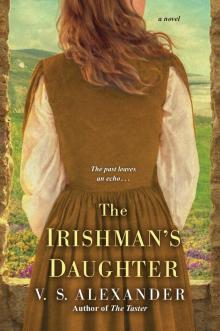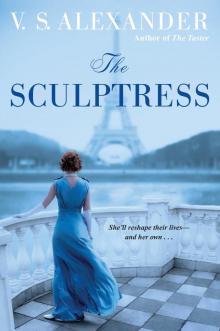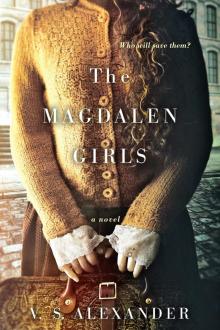- Home
- V. S. Alexander
The Irishman's Daughter Page 9
The Irishman's Daughter Read online
Page 9
She wanted him in that moment, and she hoped that he might feel the same. Pushing back her carnal thoughts, she turned again to the fire. She touched the gently swirling water in the pot with the tip of her finger. It was warm, not scalding.
“Do you have a cloth I can use to clean your face?” she asked.
“Under my shirts,” he said.
She found it, poured the warm water into a pan, and placed it beside his head. She sat next to him, dipped the cloth into the liquid, and swabbed the bruises on his face.
A smile of gratitude shone on his face, an emotion as true as any she’d ever gotten from him. His hand brushed against hers, and the warm touch of his fingers jolted her.
“Not too hard,” he said. “My face feels as if it’s been beaten with a club.”
“My sister was right about Irishmen.” She rinsed out the cloth in a pan of cold water.
“Oh, the devil with her.” He took her hand and guided it over his face as she washed him.
“You won,” she said. “I hope you got what you wanted.” She added a touch of sarcasm to her voice. “Whatever that might have been.”
“I did and I didn’t.”
“What do you mean?”
“I won, but I’ve agreed to join the Molly Maguires.”
She sighed, and her head sank against her chest.
“What’s wrong?” He lifted up on one elbow. “I pledged to fight Connor. I won. It was my decision to dictate the terms. Simple as that.”
Briana rose from the bed and walked to the fire. She dropped the cloth into the water, now at the point of boiling. “You never told me what you were fighting for—only that it was a ‘matter of principle.’ Well, you’ve won, and now you’re joining the Maguires? What for—more fighting and bloodshed?”
Rory swiped a lock of hair off his forehead. “Let me explain.” His face soured, as downtrodden as a scolded puppy.
She loved him, but lately she had found his actions disagreeable. Fighting Connor was one thing, but the Maguires were another matter. Her mind would never be calm because of constant worry about him. What if he was arrested for treason or, worse yet, shot in some senseless battle against the government? An instinct to flee rushed through her, but his forlorn expression softened her heart. “Go ahead,” she said.
“I’ve worn the green ribbon, but I’ve decided Connor is right. The Maguires will get more done here—in the village, in Mayo—we must resist the owners, the agents, and the ways of English tyrants who govern as if we deserve this plague.” Anger filled his voice. “They, who take our food and eat, while our people starve—”
Briana held out her hand. “Stop. Don’t you dare include my father as part of this tyranny.” She took a dipping stick, fished the cloth from the water, and let her anger and the cloth cool before tossing it to Rory.
He rubbed his face, chest, and arms with it and dropped it into the pan by his bed. “It took Connor Donlon to change my mind. He was willing to fight for what he believes is right, and by God, he is right. People are dying and nothing’s being done. I hope I’ve not come to this decision too late. Our voices must be heard.”
Her hands shook and her body felt as if her bones had turned to tallow. The anger underlining Rory’s words meant that he was willing to fight, perhaps even die, for the Maguires. She swayed toward his bed. He caught her and guided her down beside him.
“Have you given no thought about us?” she asked, catching her breath.
“Of course,” he said in a warm voice. “I love your father, as my own rests in his grave.” His swollen and bruised fingers worked at the cloth strips around his knuckles. “I know your father and your sister think less of me than you do—and, I must admit, there is reason in their thinking.” He flung the bloody cloths into the corner and turned her face toward his with his hands. “What have I to offer? A pig soon to be slaughtered because there is nothing left to eat? I have no money, little education. Your father has always scolded me because I cannot read. Your sister thinks of me as an uneducated farmer, and perhaps she’s right. My chances to gain favor with your family are slim.”
Briana nodded. “I’m not going to tell my sister of your association with the Maguires, but I can’t keep this a secret from my father. He’s sure to find out from someone in the village. You can’t stop gossip.” She softened her tone. “But it’s not my family you need to win over. You know where my heart lies. It has been with you since I saw you when I was still a child and you were a young man and I had no idea what that joy in my heart meant. My brightest memories are those of us walking in the village, singing with friends, walking the cliffs, watching the waves crash against the Stags of Broadhaven. Remember the time my father told us the ancient story behind Lear House?”
“Yes,” he said, “but we aren’t bewitched swans destined to swim for nine hundred years until the curse falls away. The famine is real, and death walks through Ireland.”
Sadness pricked her heart. Lear House was her home—all she had ever known—and she wanted it to remain so. The idea of losing her family and her home shook her to her core. “Then we must do what we can to survive.”
“I realized that when I beat Connor today. Even in my victory, he was right and I was wrong. The time for debate has passed. The Maguires live for action, not words.”
He grasped her hands with a rough and calloused grip. She stretched his fingers and caressed the sore knuckles. He flinched. Then she moved her hands to his face and stroked the side of his head. Rory moaned and lay back on the bed.
She hovered over him for a moment and then kissed him.
He placed his arms across her back and pulled her toward him.
She wanted to melt into him, cover his face with kisses, run her fingers across his chest and stomach until he was fiery with desire, but he was bruised and bloody from the fight. She kissed him again, drew away from his body, and nestled against his side.
He pulled her close, but she pushed herself away. “No, not now,” she said. Her mind reeled from his decision to join the Mollies. A husband who condoned violence, who put himself in danger, was a different matter. He had chosen a path that she could accept only if he made some concessions to her terms. She didn’t have the courage in this moment to ask him to change his mind or take a lesser role in the group. Yet she loved him and felt closer to him than she had ever been. That feeling brought up the disturbing thought that she might have to choose what was best for her.
She sat on the bed listening to Rory’s breath. Her father, now that the afternoon was growing late, would expect her home soon. She rose, left him lying on the bed, gathered her things, and asked, “When will I see you?”
“Tomorrow,” he said with a rueful smile. “I have no fear of showing my face, but I’m not sure how others will react to it.”
She opened the door and was greeted by the still murky day. She took a deep breath, intentionally filling her lungs with air cleansed by the rain and the wind off the ocean. The force of it chilled her face and arms. Wrapping up in her coat, she headed for the cottage. Her father and sister would be expecting their supper of oats and bread. Her mind whirled with thoughts of Rory and the way life had always been at Lear House. She was fighting to preserve her family and history. Rory was fighting a different battle that seemed destined to touch them all.
Cooking would be a small distraction, but her mind would be elsewhere—on what mattered most—saving Lear House and their lives.
CHAPTER 6
May 1846
The rat skittered beneath the pantry door; its long tail slithered after it like a snake gliding into its den.
“Damnation.” Brian held a candle before him, happy his daughters weren’t around to hear him curse. Of all the rooms in the house, the kitchen was his least favorite. At the back of the main structure, it stood against the hill that rose to the Atlantic cliffs. Aside from a small glass inset in its door allowing an occasional peek in from the owners, Blakely’s ancestors had no interest in stepping
into the kitchen as long as the food and the service were up to their standards. The room was damp in the summer when the rain streamed down the slope and cold in the winter when the northwest winds howled down the hill from the ocean. On this rainy day in early May, the kitchen remained true to its nature: the stove and cabinets dull in the candlelight, the air murky.
He had come to the house to write letters and review the books once again. The accounts looked bad—every month they looked worse. With the crop failing, more men had turned away from the land looking for work in cities or in other countries. While farming, men would be lucky to earn a few pence a day from their crops. Brian had heard of income, with work scarce, of a tuppence half-penny a day, often less than what they earned from their lands. No family could live on such low wages.
Without a potato crop and little or no money, the family would be lost. The tenant farmers had come to rely on the potato. How many family suppers had he been invited to in better times? Every Irish woman knew how to serve them boiled, cubed, or mashed, fried in the form of cakes or in soups with buttermilk. He realized now that culinary history was part of the problem—women only knew how to cook potatoes.
He opened the cupboard and looked at the once-filled jars of oats and rye. He picked one up, and the light weight of it shocked him. Supplies had dwindled so much that Briana had to ration what they ate. Rat droppings lay on the shelves. Even the little beasts were fighting their way inside for food. There was nothing to eat outside, no human refuse to feed them, so instinct brought them into the house. He and Rory had talked about making a second trip to Westport to get Indian corn. Looking at the remaining food in the pantries, he realized the journey would soon be a necessity.
He sighed and thought of Lucinda and Briana still in the cottage. Sleep had ended early for him, long before dawn, cut short by the worrisome tasks that weighed on his mind. Lucinda, surrounded by her books, would be asleep in the largest bedroom. Briana was awake now, preparing breakfast from their ever-decreasing supplies. She slept in his room when Lucinda was home. Covered by a muslin sheet, he preferred to sleep on a bed of rushes and straw in front of the fire. His bedroom was too redolent of memory: his wife’s wooden crucifix and rosary beads, her lace collars and stickpins, the family drawings she had collected over the years. All these reminded him too much of the past when life was tolerable—even good—as he remembered it. Yes, there had been times of famine and pestilence before, but they were balanced by times of plenty and pleasure.
Now times were frightful, and he had no answers even after long discussions with his daughters. Rory had told him matter-of-factly that a provision ship had been plundered in County Kerry in April when a mob of women and children stopped provision carts from going to the shops. They had taken only food, and no one was injured. He also told him with less enthusiasm that landlords, agents, even tenant farmers, had been threatened. The farmers were “encouraged” not to pay their rents. He suspected that Rory had found out such news through his affiliation with the Molly Maguires, but he didn’t want to know for certain, because he shared Briana’s aversion to the group.
She had told him on the sly about Rory’s decision after fighting Connor Donlon. The young man’s participation in the group didn’t please him, but what could he do? As far as he was concerned, it was his business as long as no harm came of it. He scratched his chin. Sometimes it was better to “let sleeping dogs lie.”
He stepped into the hall leading to the stately entrance of Lear House. The pale light of dawn filtered through the glass panels on either side of the door. How cruel for all these grand rooms to sit empty for nine months of the year, only to await the pleasure of Master Sir Thomas Blakely, who had strong attractions to liquor, gambling, and women, and who, with dwindling funds of his own, couldn’t afford to save Lear House should finances undermine its foundation. The solid oak furniture, the ancestral paintings, the hand-painted china, the blue Delft vases on the mantel, might add artistic pleasures to Blakely and his guests during the short summer months, but what of the rest of the year? He had learned every chink in the tile, every chip in the floorboard paint, every crack on the staircase.
Could these rooms and the items in them be used to support those who needed aid the most? What was Lear House, and its furnishings, worth? As agent of the estate, he had a good idea—a tidy sum of a hundred thousand pounds or more that could support many Irish families for years.
He stepped into the dark library following a circle of light radiated by the candle. The worthless ledger books lay open on the desk, as useless as the house. They struck him as hollow, shallow, mere shadows of a former greatness, now diminished by debt and famine. He ran his fingers down the sheet studying the names, families he had known for years: the Baileys, with their two young daughters who always looked for sweets; the Canavans, farmers for generations on Lear House lands; the Donlons, with their love of dogs and cats; the Duffys; the Flynns; the list went on. Men and women he had seen marry, become parents, raise a family, and die. They were his own—fellow travelers on life’s journey.
Despite what anyone thought in England, or in the Irish government, or in the press, a full-blown famine was ravaging Mayo. Something had to be done. But what? Perhaps he was too old, too sentimental, to think clearly about such things, and he worried about his daughters. Lucinda, the most educated, he saw as the intellect of the pair, and Briana the body and heart. Lucinda had shared her earnings with the family and kept some for herself, at his insistence, for her later years. He expected her to return to her governess duties after the summer, having been dismissed by the family in the late spring. If she was in England, he wouldn’t have to worry. Briana was another matter. She was happiest at home roaming the cliffs no matter the weather, talking with the farmers, cooking and cleaning. He knew she wanted children, and someday he prayed that would happen. A grandchild would have made his wife happy. She now rested in her grave of sixteen years near Carrowteige. The winter of her death from the grippe had been the worst of his life. Perhaps, if he could convince them, his two daughters could work together without rancor or jealousy and find a way to save Lear House.
He blew out the candle and walked through the hallway made dim by the rain. Briana would have breakfast waiting at the cottage.
The door was ajar. He looked into the great room—nothing stirred in the shadows.
“Briana?” he called out. “Lucinda?” No one answered. Apparently, he had not closed it properly when he came in.
Satisfied that no one was in the house, he stepped out on the stone terrace. He closed the door and then saw the paper thrust under the knocker. Dread filled him even before reading it, and his hand shook a bit as he opened it. The silvery dawn light allowed him to read the scrawled words that looked like a child’s handwriting.
First, retribution, and then death, if nothing was done to alleviate the suffering of the Lear House tenants. It was signed MM at the bottom. The Molly Maguires? He would ask Rory about this threat; perhaps he would recognize the writing, forced as it was.
He clutched the paper to his heart and prayed that God’s will be carried out, that the Maguires should understand he was not a bad man. He was only doing his job. Lear House had so far been relatively unscathed by the famine, but he and his daughters couldn’t hold out much longer. Even they would be touched, and the Maguires surely knew that. Then a horrible thought struck him: What if Rory was involved in this? Could the young man be so callous, so unforgiving of a man who had often thought of him as the son he didn’t have? It wasn’t possible. Rory could barely read and didn’t have the skill to write such a note. He stuck the paper in his pocket and surveyed the tenants’ homes on each side, pearly smoke wheeling to the sky from the thatched roofs.
He was looking for an intruder on the grounds when he spotted the black specks on the hillsides. He strained to see them through the rain. They were huddled together near the stone and brush fences that separated the estate from the surrounding land and village. How
many he couldn’t say—a dozen, two dozen, maybe more, bunched in clumps like muddy pillars against the sweeping hills. The men stood apart, sheltering their women and children with their coats.
He gasped. What could he do for the silent figures who lined the hillside?
Brian locked the door, then scurried down the steps and across the lawn. He felt like the rat he had seen earlier, running from trouble. Their eyes bored into him, past him, pushing him, it seemed, into Broadhaven Bay.
He opened the cottage door. Briana stood near the fire, cooking. He struggled to catch his breath, to speak of what he’d seen as her welcome smile faded.
“Da, what’s wrong? Are you well?”
He pointed out the door and sank into his chair.
Briana was in her brown skirt and beige apron, her hair held in place by a kerchief. Lucinda sat at the table, her hands and face freshly scrubbed, her dress smoothed down to the tops of her shoes with their tiny heels.
“Look for yourselves,” Brian said.
His daughters dashed to the door and stepped out in the rain. They soon returned with questioning looks on their faces.
“Are those people?” Lucinda asked. He could tell she didn’t want to believe her eyes.
“Of course,” Briana said. “The famine has reached us.”
“What are we to do?” Brian asked. A disquieting uneasiness rose in him, which until now he had been able to avoid. “I have no answer.”
“Breakfast is ready,” Briana said, returning to the fire. She scooped cooked oats out of the pot, covered them with honey, and placed them on the table.
The irony of her words wasn’t wasted on him. “We don’t have enough to feed them. I saw firsthand how the supplies are dwindling. Even the rats are searching for food.”

 The Irishman's Daughter
The Irishman's Daughter The Sculptress
The Sculptress The Taster
The Taster Her Hidden Life
Her Hidden Life The Magdalen Girls
The Magdalen Girls